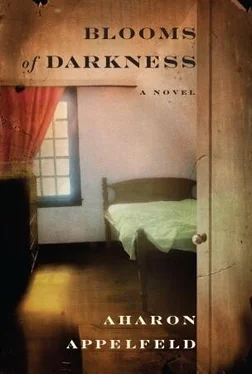In the square, the refugees crowd around a large army pot full of soup. They eat the soup while standing, everyone keeping to himself. There’s haste in their movements, like animals who have been hungry for days, and now, when they have obtained what they want, no longer have any interest in their fellows.
Hugo is thirsty. He’s afraid to leave, in case Mariana is released and fails to find him. The thought that in a little while she will be freed, and that they will set out again, arouses new hope in him. With great clarity, Hugo remembers the blazing campfires and the fish they grilled on the coals. For Hugo, it is as though Mariana has been sculpted from that wonder. In vain he tries to remember one of her marvelous sentences. But, as though to spite him, nothing comes to mind.
“Mariana,” he calls out, wanting her to appear to him.
The street grows quieter, and the refugees who surrounded the pot of soup also disperse. Only a few people remain, leaning against the walls, smoking cigarettes and talking. Hugo is thirsty and decides to approach the pot. He takes a metal bowl out of the suitcase, pours some soup into it, and sits down.
A refugee comes up to him. “Who are you?” he asks.
“My name is Hugo.”
“And what is your family name?”
“Hugo Mansfeld.”
“The pharmacists’ son?”
“Correct.”
“In the morning they give out tea and sandwiches here,” the man says, and goes on his way.
Only now does he grasp what is going on: some people have been liberated and others are being sentenced behind the walls. The liberated ones run from place to place, looking for something. Hugo works up his courage, approaches one of them, and asks, “What’s going on here?”
“Nothing. Why do you ask?”
“It seems to me that everybody is looking for something.”
“You’re wrong. Everybody has gathered here because there’s soup. There’s nothing like hot soup for a thirsty body,” he says, and smiles.
Hugo returns to his place near the gate. The short conversation with the refugee, which revealed nothing, leaves him uneasy. For a moment it seems to him that the man bears a horrible secret within him, and that all of his words and movements are meant only to distract people from his secret. Now the man is leaning against the wall of a building and smoking hastily. From Hugo’s corner he looks tall and broad-shouldered.
Later, the guard at the gate asks him, “Who are you waiting for?”
“For my mother.”
“Where is she?”
“She’s inside. Will she be there for a long time?”
“Who knows?” says the guard, and turns his back.
All night long Hugo waits tensely for Mariana’s return. His expectation gradually fades, and toward morning he falls asleep. In his dream he sees his father, tall and sturdy, wearing a long coat, and looking like one of the refugees who are standing next to the pot of soup.
“Papa,” Hugo calls out, and goes up to him.
The man turns a stranger’s face to him. “Who are you looking for?” he asks.
“Sorry,” replies Hugo, and withdraws.
“From now on, be careful,” says the man, and turns away.
Hugo wakes up. The refugees aren’t strangers to him. But the expression on their faces and their movements show that they have undergone an inner change that is difficult to explain. Hugo recoils from them. Instead, he approaches the pot, pours himself some soup, and takes a sandwich. Then he sits down.
Mariana is always late. She sometimes forgets that people are waiting for her, he says to himself. Now Hugo clearly remembers the closet and the thick darkness that pervaded it most of the day. But he also recalls how much light there was in Mariana’s face when she stood in the doorway and apologized. “I forgot my darling. Right away I’ll bring him something to eat. You’ll forgive me, yes?” And he did indeed forgive her.
Now Hugo imagines her return in similar fashion.
Meanwhile, several refugees have gathered around the pot. They seem withdrawn and don’t speak. The soup is hot and it warms him. He pours himself another bowlful and finds a corner from which he can see the gate.
The gate doesn’t open. Hugo once again visualizes the journey he made with Mariana after they left The Residence. It now seems long to him, and colorful, as though it lasted not weeks but months. Mariana wasn’t optimistic, but she was prepared to delude herself into believing that in the mountains no one would find them.
From hour to hour, her expression changed, first earthy and infatuated with herself, and then all wounded longings for God. Throughout his life, Hugo will remember Mariana often. She is with me wherever I go , he will say. Many years have passed, and she is still with me, as she was when I saw her in the doorway of the closet .
During the long, dark nights in the closet, Hugo would dream that he had been liberated from that prison cell he had been locked in and was running home. That dream would recur often, and in different versions. Now here he is sitting a few streets away from his house, not far from the pharmacy, a ten-minute walk from Anna’s house and almost the same distance from Otto’s house, and he doesn’t move from his place.
“What’s your name?” A woman refugee speaks to him softly.
“My name is Hugo,” he tells her.
“I wasn’t wrong. You’re the son of Hans and Julia.”
“That’s right.”
“I’ve known your parents since I was a child. What are you doing here?”
“I’m waiting for the woman who saved me.”
“Take care of yourself. There are horrible people here.”
“I’ll watch out,” he says, trying not to prolong the conversation with her.
“I knew your parents very well. I even worked in their pharmacy for a while. You were three or four years old, so you don’t remember me. My name is Mina. I studied with your parents at the university. I didn’t finish.” She speaks with intense brevity, cramming a lot of information into a few sentences. Hugo is distracted. He is afraid to look away from the gate. He doesn’t ask her anything, so she says, “In a little while the people responsible will come and show us our temporary quarters. Don’t go away.”
How strange, Hugo thinks to himself, that gentle woman who spoke to him pleasantly and in his mother tongue also left him filled with disquiet.
Meanwhile, the guard at the gate has been replaced. Now an old soldier is standing there, dressed in a long coat. It seems to Hugo that the old man will listen to him and will tell him something about the interrogation going on inside.
“My mother’s inside. How long will she have to be there?” Hugo overcomes his hesitation and asks.
“It depends on the interrogation. Now they’re sentencing the whores who slept with the Germans.”
“Will they give them a severe punishment?”
“The degree of punishment will be according to the severity of the sin,” says the guard, pleased with his words.
Hugo is tired after an agitated night. The people and the sights that surround him got mixed up with his nightmares. He tries to clarify what was the nightmare and what is reality, but fatigue overcomes him, and he falls asleep.
When Hugo wakes, the sun has already set. The old soldier is still at his post. His unassuming presence encourages Hugo to ask, “Is the interrogation finished by now?”
“Apparently not.” The guard is stingy with his words.
“How long do you estimate it will continue?” Hugo speaks like an adult.
“I’ve stopped asking myself questions like that,” the guard replies, without bothering to look at Hugo.
Hugo returns to the square. Two young soldiers are filling the pot with fresh soup. The refugees observe them tensely. Hugo, too, stands and observes: the refugees are speaking German, using all the words he heard in his home, but they are not like his parents. Their way of standing shows that they have been in hiding places, and they move with caution. Before taking a step, they carefully look all around, like hunted animals.
Читать дальше












